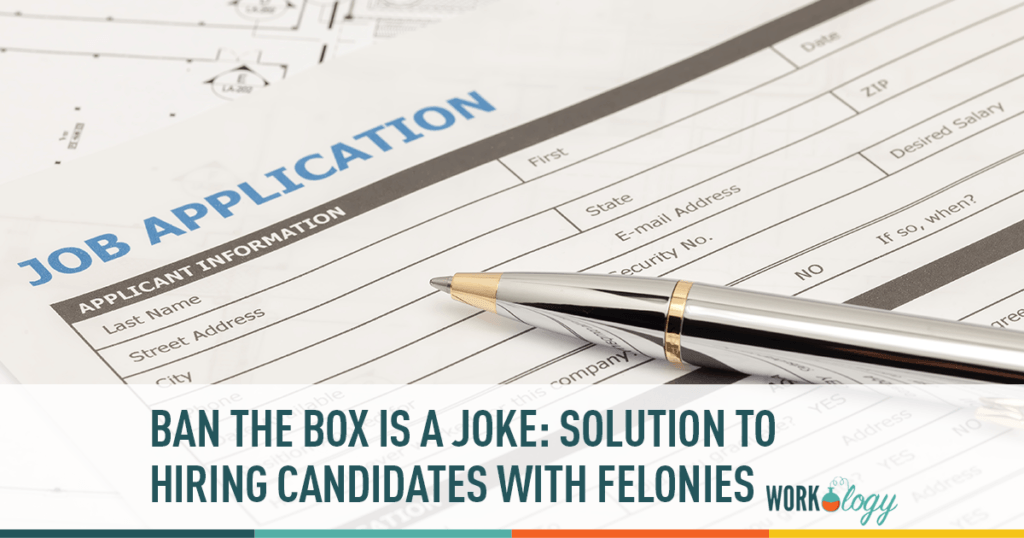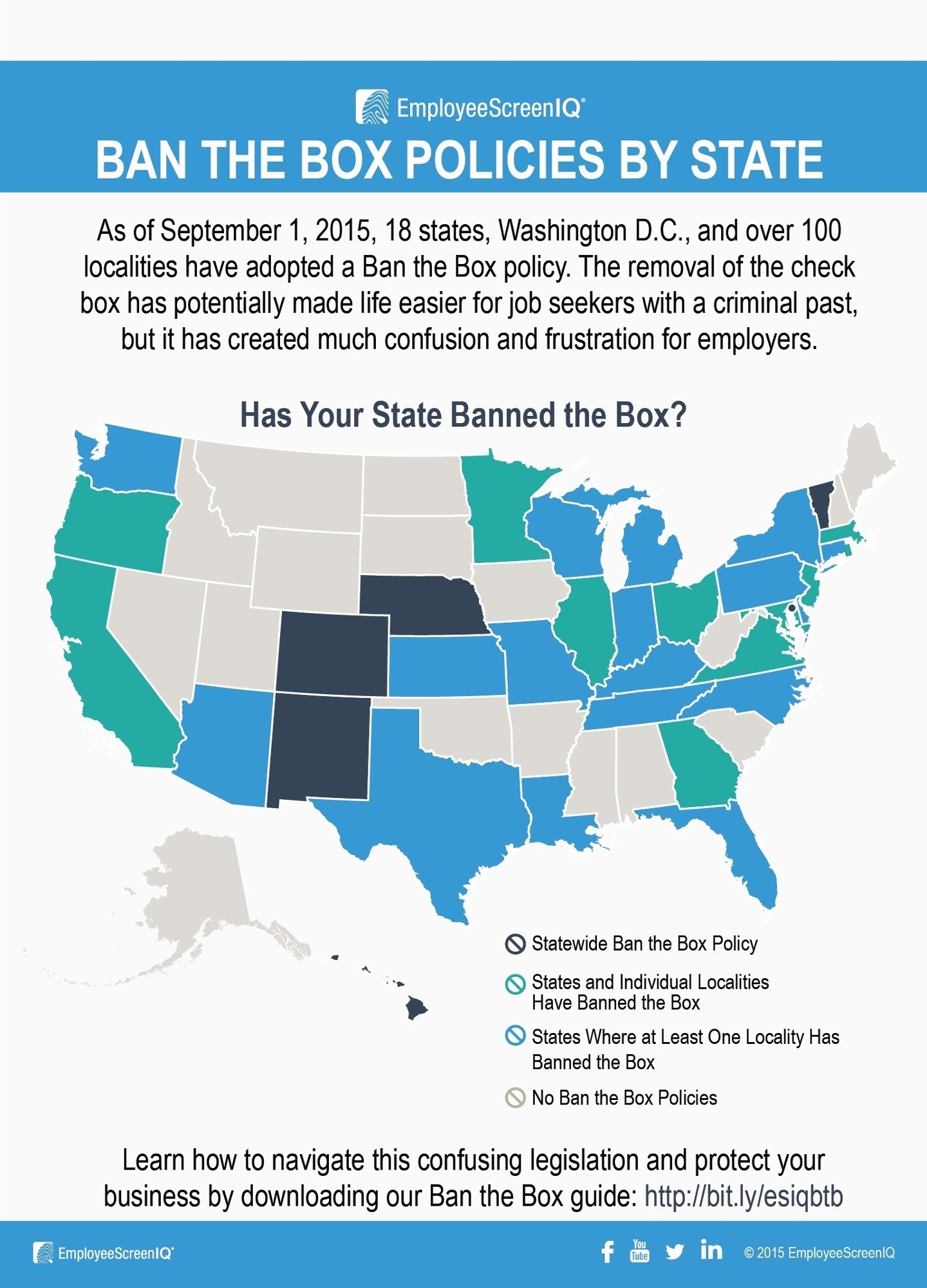On Monday President Obama began directing federal agencies to “ban the box” in their hiring decisions, prohibiting them from asking prospective government employees about their criminal histories on job applications. Essentially, federal employers are not allowed to inquire as to a candidate’s criminal history until after the employer has provided a conditional job offer. Only then are employers authorized to ask a candidate about their criminal backgrounds. Additionally, employers must also be in compliance with local laws as well as the Federal Credit Reporting Act or (FCRA)
What Ban the Box Means for Employers and Job Candidates
The Ban the Box movement isn’t new. It “went viral” in the summer and fall of 2014 as New Jersey, Illinois and the District of Columbia signed the provision into law. Eighteen states and over 100 local municipalities have Banned the Box and counting. For more information, you can see the infographic below.
But Ban the Box surfaces a bigger and more complex challenge for employers. Companies are increasingly using background checks as a way to protect themselves from liabilities as well as criminals from working at their companies. Employers have a certain amount of discretion after a candidate fails a background check. As an employer, there are generally three reasons why prospective candidates fail a background check.
Candidate Fails to Disclose Their Criminal History
If a company is housed in a state that Bans of the Box, employers can only ask for your criminal history after the job offer. Candidates often assume a felony has been expunged from their record, were told employers don’t do federal background checks or just think their histories won’t be found because they did something like changed the spelling of their name.
The background check business in HR and recruiting is a big one. Keep in mind the entire background check and screening industry as a whole was a $2 billion industry in 2014 which includes employers, landlord and consumer reporting. Background checks as a whole have been on the rise as the economy has recovered. Employers are more concerned than ever on quality hiring and employee retention for their companies.
Candidate’s History is Inaccurate or Incomplete
This could include employment history, educational information or just background information that led to a red flag for a company. Employers use your previous mailing addresses to check local and state records and verify your schooling and employment using the information you provide.
Sometimes these inaccuracies are not the fault of the job candidate. Sometimes local records are old paper and file systems or the collection process takes days instead of weeks. I once received the background check result of a job candidate I offered a job at my company who was found to be using a dead person’s social security number which proved to be the state social security department’s error. Yes, someone issued my poor job candidate a dead person’s social security number when he was born, and he didn’t even know it until he was 23.
The Candidate Has Committed a Felony in the Last Seven Years
This isn’t a hard and fast rule, however, I’ve had to fail a number of background checks in my time when it was learned a candidates we offered a job as processing payroll or handling money had a felony for bad checks or fraud. The best HR professionals evaluate failed or flagged background checks on a case by case basis. For example, I can’t hire someone with a history of DUI’s who would be driving a forklift for the majority of their job responsibilities. It’s a safety thing.
Just because you have a criminal job history doesn’t automatically mean a job offer will be withdrawn upon the completion of the background check. However, employers will be evaluating each of these on a case by case basis. Typically the rule is employers tend to look the other way if the felony has been more than 7 years unless it’s something really egregious like manslaughter or sex offenders. Employers want to keep their work places safe. Plus, they don’t necessarily want the PR fallout if something happens. It doesn’t mean that it will, however, the media loves a story and no boss wants to become front page news because of a bad hiring decision they made.
The Problem with Ban the Box
The problem with Ban the Box is that it delays the background check process, but it doesn’t eliminate or really change the employer’s decision making. Banning the box wastes the time of hiring managers and the job candidate. Banning the Box is a media stunt pure and simple. It’s doesn’t really address the challenge of job candidates who have a felony conviction in finding work.
Instead of the candidate knowing upfront the company won’t hire those who have a criminal work history, the candidate spends two or more hours of his/her time in job interviews not to mention the commute time and preparation for something that won’t be happening. As for the employers, Banning the Box only increases hiring and recruiting expenses because employers spend more time interviewing candidates which in turn is forcing them to invest in other hiring surveys and assessments to suss out the best candidates.
If the government really wanted to Ban the Box, they would invest in a government program like the WOTC also know as the Work Opportunity Tax Credit providing a tax incentive for employers who hired job candidates with a criminal record just like the do for those who have received government assistance or military veteran candidates. Employers can also commit to hiring those with a criminal history. If we ignore the problem, nothing will change. A checkbox isn’t our silver bullet to employing those with criminal histories.










2 Comments
Thanks for writing, Jessica! Although I do agree that a tax credit might work better, I do think this helps eliminate some some bias in the hiring process that can lead to fixable outcomes. First, people who get caught with stupid charges like possession or marijuana or underage drinking because they got caught at a college party will not automatically be kicked out of automatic resume readers. Second, it requires employers to actually look at a candidate’s resume – what they have done to better their career – before the employers are hit with the “criminal” stereotype. Finally, it opens the dialogue to give job candidates an opportunity to explain themselves. Do the candidates have a reasonable explanation for their record? Were they stealing bread to feed their kids? Were they just in the wrong place at the wrong time? Although this might not be the best solution, I think it’s a reasonable start.
I think that some kind of tax incentive for employers that actually hire someone with a criminal history would be a great idea. Banning the box that asks the “dreaded” question, does nothing, especially if the candidate still has to undergo scrutiny through a background check later. for example, a returning citizen, who unfortunately went through the prison system almost 20 years ago, yet still cannot find employment, (I am also wondering if the only persons that can get a job with a past felony conviction (s) are those whose charge is not for something like embezzlement, or tax evasion, or sex crimes}, recently applied for a part time position for a major company that sells sewing classes, among other things. they had a lot of experience,was the top candidate and even the manager even supported my hiring. They were even offered the position and then it was withdrawn after they took almost two weeks to do a background check. They have not been in trouble since and had other positive work experience. the question was not on the application, but it should have been. wasted a lot of time and effort on both their parts.
Comments are closed.